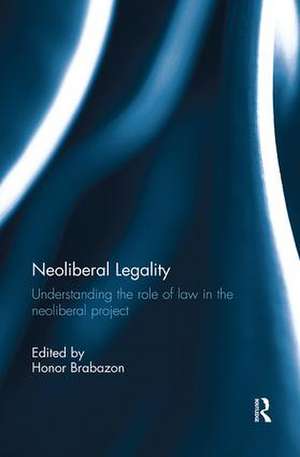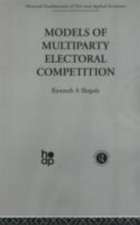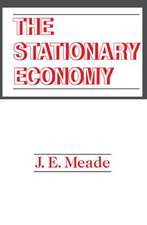Neoliberal Legality: Understanding the Role of Law in the Neoliberal Project
Editat de Honor Brabazonen Limba Engleză Paperback – 11 mai 2018
| Toate formatele și edițiile | Preț | Express |
|---|---|---|
| Paperback (1) | 300.91 lei 6-8 săpt. | |
| Taylor & Francis – 11 mai 2018 | 300.91 lei 6-8 săpt. | |
| Hardback (1) | 764.20 lei 6-8 săpt. | |
| Taylor & Francis – 17 noi 2016 | 764.20 lei 6-8 săpt. |
Preț: 300.91 lei
Preț vechi: 342.27 lei
-12% Nou
Puncte Express: 451
Preț estimativ în valută:
57.60€ • 62.58$ • 48.41£
57.60€ • 62.58$ • 48.41£
Carte tipărită la comandă
Livrare economică 21 aprilie-05 mai
Preluare comenzi: 021 569.72.76
Specificații
ISBN-13: 9781138606135
ISBN-10: 1138606138
Pagini: 214
Dimensiuni: 156 x 234 x 30 mm
Greutate: 0.52 kg
Ediția:1
Editura: Taylor & Francis
Colecția Routledge
Locul publicării:Oxford, United Kingdom
ISBN-10: 1138606138
Pagini: 214
Dimensiuni: 156 x 234 x 30 mm
Greutate: 0.52 kg
Ediția:1
Editura: Taylor & Francis
Colecția Routledge
Locul publicării:Oxford, United Kingdom
Public țintă
Postgraduate and UndergraduateCuprins
Introduction, Honor Brabazon 1. Law, Development, and Political Closure Under Neoliberalism, Tor Krever 2. Neoliberalism and Economic Sovereignty: Property, Contracts, and Foreign Investment Relations, Nicolás Perrone 3. Neoliberal Law and Regulation, Andrés Palacios Lleras 4. Law, Social Policy, and the Neoliberal State, Kenneth Veitch 5. Law, Neoliberalism, and the Constitution of Political Subjectivity: The Case of Organised Labour, Robert Knox 6. Continuity and Rupture in Restraining the Right to Strike, Ntina Tzouvala 7. The Promise of Rights: International Indigenous Rights in the Neoliberal Era, Kristin Ciupa 8.. Dissent in a Juridified Political Sphere, Honor Brabazon 9. Alegality: Outside and Beyond the Legal Logic of Late Capitalism, Vanja Hamzić
Descriere
This book provides a systematic attempt to develop a holistic and coherent understanding of the relationship between law and neoliberalism. It does not, however, examine law and neoliberalism as fixed entities or as philosophical categories. And neither is its objective to uncover or devise a ‘law of neoliberalism’. Instead, it uses empirical evidence to explore and theorise the relationship between law and neoliberalism as dynamic and complex social phenomena. Developing a nuanced concept of ‘neoliberal legality’, neoliberalism, it is argued here, is as much a juridical project as a political and economic one.

















